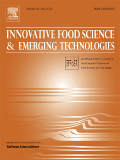
Innovative Food Science & Emerging Technologies
Scope & Guideline
Pioneering Research for Tomorrow's Food Solutions
Introduction
Aims and Scopes
- Food Processing Technologies:
The journal explores cutting-edge technologies including non-thermal methods, microwave processing, high-pressure processing, and pulsed electric fields to enhance food quality and safety. - Food Safety and Microbial Control:
Research on methods to control foodborne pathogens, such as the application of cold plasma, UV light, and advanced sanitation techniques to improve food safety. - Nutritional Enhancement and Functional Foods:
Papers focus on enhancing the nutritional profiles of foods through innovative processing techniques, including the extraction of bioactive compounds from natural sources. - Sustainability and Waste Valorization:
Research on sustainable practices in food production, including the utilization of food by-products and waste materials for developing functional ingredients. - Food Packaging Innovations:
The journal highlights advancements in food packaging technologies that improve shelf life and maintain the quality of food products, including smart packaging solutions. - 3D Food Printing and Food Design:
Exploration of the applications of 3D printing in food design, including the development of new food structures and textures.
Trending and Emerging
- Non-Thermal Processing Technologies:
There is a growing interest in non-thermal methods such as cold plasma, pulsed electric fields, and high-pressure processing, which are seen as effective alternatives for preserving food quality and safety. - Plant-Based and Alternative Proteins:
Research into plant-based proteins and alternative protein sources (e.g., insects, algae) is increasing, driven by consumer demand for sustainable and nutritious food options. - Artificial Intelligence and Machine Learning Applications:
Emerging applications of AI and machine learning in food processing and quality control are trending, reflecting the industry's move towards data-driven decision-making. - Innovative Food Packaging Solutions:
Research on smart and sustainable packaging technologies is on the rise, focusing on enhancing food preservation and reducing waste. - 3D Printing and Food Design Innovations:
The use of 3D printing technology in food design is gaining momentum, showcasing new possibilities for creating customized food products. - Sustainable Practices and Circular Economy:
There is an increasing emphasis on sustainability in food production, including waste valorization and the development of eco-friendly processes.
Declining or Waning
- Traditional Food Processing Methods:
There is a noticeable decrease in research focused on conventional cooking methods as more innovative technologies gain traction and demonstrate superior outcomes. - Basic Nutritional Studies:
Studies focused solely on basic nutritional profiles without the integration of innovative processing techniques are becoming less common as the field shifts towards functional and enhanced food products. - Chemical Preservation Techniques:
Research on chemical preservatives is declining as the industry moves towards natural and innovative preservation methods that align with consumer preferences for clean labels.
Similar Journals

ACS Food Science & Technology
Bridging Academia and Industry for Food SolutionsACS Food Science & Technology is a premier peer-reviewed journal published by the American Chemical Society (ACS) that addresses the dynamic intersections of food science, chemistry, and technology. With its E-ISSN: 2692-1944, this journal aims to disseminate innovative research and comprehensive reviews that enhance understanding in fields such as analytical chemistry, organic chemistry, and general food science. Despite the absence of an Open Access model, its position in the Q2 quartile for multiple categories in 2023 underscores its significant impact on the scholarly landscape, ensuring researchers can access high-quality research pertinent to today's food challenges. With an expanding timeline of 2021 to 2024, ACS Food Science & Technology is poised to be an essential resource for advancing the scientific community's knowledge, fostering collaboration, and bridging gaps between academia and industry.
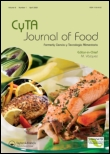
CyTA-Journal of Food
Transforming the food landscape with impactful research.CyTA-Journal of Food is a prestigious academic journal published by TAYLOR & FRANCIS LTD, dedicated to advancing the field of food science and technology through the dissemination of innovative research and practical knowledge. With an ISSN of 1947-6337 and an E-ISSN of 1947-6345, this journal stands out with its strong impact factor and is currently placed in the Q2 quartile across multiple categories, including Chemical Engineering, Chemistry, and Food Science, making it a vital resource for researchers and professionals alike. The journal has been an integral part of the academic community since its inception in 2009, and continues to publish cutting-edge articles through to 2024. Its alignment with Scopus ranks further signifies its influence, notably achieving 67th percentile in Industrial and Manufacturing Engineering. As an Open Access journal, it ensures widespread accessibility to its valuable content, promoting collaboration and knowledge sharing among scientists, engineers, and students dedicated to enhancing food safety, quality, and sustainability.

Ukrainian Food Journal
Connecting researchers to transform food systems.Ukrainian Food Journal is an esteemed open-access journal dedicated to advancing the field of food science and biochemistry. Established in 2012 and published by the National University of Food Technologies in Ukraine, the journal serves as a vital platform for researchers and professionals to disseminate their findings on food technology, safety, and nutritional biochemistry. With an ISSN of 2304-974X and E-ISSN 2313-5891, it offers a wealth of knowledge to its readers, promoting innovation and collaboration within the industry. While currently categorized within the Q4 quartile of biochemistry and the Q3 quartile of food science, the journal is progressively gaining recognition, reflecting a commitment to quality research in a competitive field. The journal is indexed in Scopus, ranking #271 in Food Science and #376 in Biochemistry, underscoring its relevance and contribution to agricultural and biological sciences. The Ukrainian Food Journal not only enriches the academic community with its open-access model but also aims to foster dialogue among researchers, professionals, and students dedicated to improving food systems and nutrition. It operates from its headquarters in Kyiv, offering a hub for creativity and advancement in food-related research.
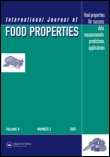
INTERNATIONAL JOURNAL OF FOOD PROPERTIES
Exploring the properties that shape our food.INTERNATIONAL JOURNAL OF FOOD PROPERTIES, published by TAYLOR & FRANCIS INC, is a leading platform for disseminating high-quality research in the field of food science. With an ISSN of 1094-2912 and E-ISSN of 1532-2386, this journal has been committed to open access since 2018, ensuring that groundbreaking studies are readily available to global audiences. The journal has steadily gained recognition for its contribution to the discipline, achieving a Q2 ranking in Food Science and placing in the 68th percentile among its peers according to Scopus metrics. Covering a wide array of topics related to the properties and applications of food, it serves as a valuable resource for researchers, professionals, and students alike. With coverage extending from 1998 to 2024, the journal continually seeks to advance knowledge and foster innovation within the food science community, making it a pivotal publication for anyone serious about this vital field.

Current Research in Food Science
Pioneering Discoveries in Food TechnologyCurrent Research in Food Science is a leading peer-reviewed academic journal published by Elsevier, specializing in the dynamic field of food science. Since its transition to an Open Access model in 2019, the journal has broadened its reach, contributing significantly to the dissemination of high-quality research. With strong rankings, including a Q1 quartile status in Applied Microbiology and Biotechnology, Biotechnology, and Food Science, it stands out as a pivotal resource for scholars. Based in the Netherlands, current research published within its pages spans a wide range of relevant topics, ensuring that researchers and practitioners stay abreast of the latest advancements. The journal's impressive Scopus rankings enhance its credibility, with a percentile standing in the 74th to 83rd range across relevant categories, underscoring its impact and importance in the academic community. Current Research in Food Science aims to foster the exchange of innovative ideas and foster collaborative efforts among researchers, making it an essential resource for those engaged in advancing the science and technology of food.

International Food Research Journal
Transforming Ideas into Impactful Food ResearchThe International Food Research Journal, published by UNIV PUTRA MALAYSIA PRESS, serves as a pivotal platform for disseminating innovative research within the field of food science. With an ISSN of 1985-4668 and an E-ISSN of 2231-7546, the journal has successfully established its presence since its inception in 2007, converging its findings through 2024. This esteemed journal holds a Q3 ranking in Food Science, illustrating its valuable contributions to the field as demonstrated by its Scopus rank of 276 out of 389, placing it in the 29th percentile among its peers in Agricultural and Biological Sciences. Although it operates under a traditional publishing model, its academic integrity and focus on high-quality research ensure that it remains a vital resource for researchers, professionals, and students eager to explore advances in food technology, nutrition, and safety. By encouraging interdisciplinary collaboration and critical dialogue, the International Food Research Journal plays an essential role in shaping the future of food science research.

Applied Food Research
Championing Innovative Processing TechniquesApplied Food Research, published by Elsevier, is an esteemed journal that plays a critical role in advancing the field of Food Science. With an ISSN of 2772-5022, the journal has established itself as a premier outlet for high-quality research, achieving a commendable Q1 ranking in the 2023 Food Science category and a 63rd percentile in Scopus rankings for Agricultural and Biological Sciences. Covering a diverse range of topics from food safety to innovative processing techniques, Applied Food Research seeks to publish pioneering studies that enhance our understanding of food systems and contribute to broader discussions on sustainability and nutrition. As it converges on its fourth year of publication, researchers, professionals, and students alike are encouraged to engage with its content through various open access options, ensuring widespread dissemination of knowledge in a field that is vital to global health and well-being. Operating out of Amsterdam, Netherlands, this journal is poised to be an indispensable resource for anyone dedicated to making significant contributions in the domain of food science.
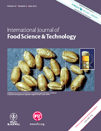
INTERNATIONAL JOURNAL OF FOOD SCIENCE AND TECHNOLOGY
Connecting Researchers to the Heart of Food ScienceINTERNATIONAL JOURNAL OF FOOD SCIENCE AND TECHNOLOGY, published by WILEY, serves as a premier platform for the dissemination of cutting-edge research in the field of food science and technology. With an ISSN of 0950-5423 and E-ISSN 1365-2621, this journal has been committed to publishing high-quality research since 1966 and is set to continue its impactful contributions through 2024. Recognized for its excellence, it holds a Q1 ranking in Food Science and a Q2 ranking in Industrial and Manufacturing Engineering as of 2023. The journal ranks #95/384 in Industrial and Manufacturing Engineering and #100/389 in Food Science on Scopus, placing it within the top quartiles of these fields. Although it does not currently offer Open Access, researchers and professionals benefit from access to a wealth of knowledge that advances understanding in both applied and theoretical aspects of food science. This journal is indispensable for anyone in the academic and professional domains who seeks to stay abreast of innovations and trends shaping the food industry.
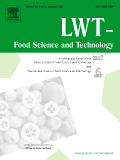
LWT-FOOD SCIENCE AND TECHNOLOGY
Connecting scholars to the future of food.LWT - Food Science and Technology is a premier academic journal published by Elsevier, specializing in the multifaceted fields of food science and technology. With a distinguished presence since its inception in 1973, this journal has evolved to become a vital resource for researchers and professionals aiming to advance knowledge in food safety, preservation, processing, and sensory analysis. Currently ranked in the Q1 quartile of food science journals, it holds an impressive Scopus ranking of 22 out of 389 in the Agricultural and Biological Sciences category, placing it in the 94th percentile. While certain articles may be available via subscription, LWT is committed to disseminating cutting-edge research that enhances food quality and innovation. This journal not only serves as a critical platform for the exchange of scientific ideas but also addresses contemporary challenges in food technology, ensuring that it remains essential for scholars, industry professionals, and students alike seeking to contribute to and stay abreast of advancements in the field.
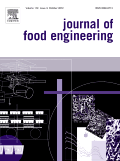
JOURNAL OF FOOD ENGINEERING
Elevating industry standards through rigorous scientific exploration.JOURNAL OF FOOD ENGINEERING, published by ELSEVIER SCI LTD, stands as a leading platform for innovative research within the realm of food science, focusing on the engineering principles applied to food production and processing. With an impressive impact factor reflective of its significance in the field, the journal boasts a Q1 ranking in Food Science and ranks #23 out of 389 in Agricultural and Biological Sciences according to Scopus metrics, placing it in the 94th percentile among its peers. Since its inception in 1982, the journal has aimed to disseminate high-quality, peer-reviewed research that informs and shapes industry practices and academic explorations. Although it does not currently offer an open access option, the journal is dedicated to fostering knowledge and innovation through rigorous editorial standards and a commitment to covering a broad range of topics related to food engineering. Researchers, professionals, and students alike will find the journal an invaluable resource for advancing their understanding of the scientific and technological facets of food systems.